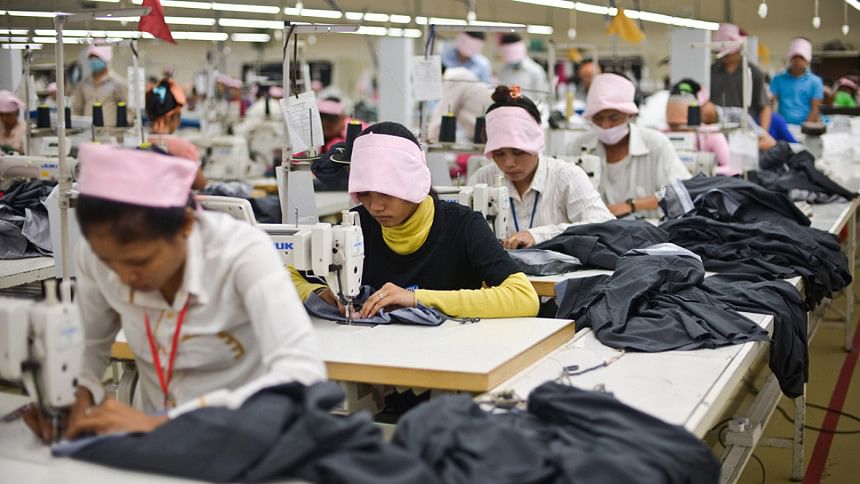Failures in Cambodia RMG sector

Workers in Cambodia’s garment factories, one of the largest producers of brand clothing often experience discriminatory and exploitative labour conditions including dismissal by employer at will and poor government inspection and enforcement, making it difficult for the vast majority of whom are young women, to assert their rights, according to a publication released on March 12, 2015 regarding Labour Right Abuses in garment factories in Cambodia.
Recent events linked to labor rights in Cambodia have attracted international attention. In January 2014, police, gendarmes, and army troops brutally crushed industry-wide protests for a higher minimum wage. Lack of accountability for poor working conditions in garment factories is at the center of troubled industrial relations in Cambodia.
The Cambodian government is primarily responsible for ensuring compliance with international human rights law, including labor rights. However, international clothing and footwear brands have a responsibility to promote respect for workers’ rights throughout their supply chains, including both direct suppliers and subcontractor factories.
Garment and textile exports are crucial for the Cambodian economy. The industry is a major source of non-agrarian employment, particularly for women. Women dominate Cambodia’s garment sector, making up an estimated 90 to 92 percent of the industry’s estimated 700,000 workers excluding many women engaged in seasonal home-based garment work.
Cambodia enacted a strong labor law in 1997. But its enforcement remains abysmal, in large part due to an ineffective government labor inspectorate. Better Factories Cambodia (BFC), a third-party monitor that focuses primarily on factories with an export license, helps fill the monitoring gap in export-oriented factories and a few subcontractor factories but cannot be a substitute for a strong labor inspectorate.
Hiring practices also influence labor law compliance. In many factories, managers repeatedly use short-term contracts beyond the legally permissible two years as a way of controlling workers, discouraging union formation or participation, or avoiding paying benefits.
Some factories, especially those working on a subcontracting basis for larger factories, also employ workers on a casual daily or hourly basis. These workers face additional barriers to unionizing and filing complaints about working conditions.
Contrary to claims by the Garment Manufacturers Association of Cambodia (GMAC) that factories using repeated short-term contracts are “black sheep,”
Human Rights Watch documented labor rights abuses in both export-oriented factories and subcontractor factories in Cambodia. In addition, women workers faced pregnancy-based discrimination, sexual harassment, and denial of maternity benefits.
Human Rights Watch discussed concerns regarding overtime work with workers in 48 factories. Cambodia’s Labor Law limits weekly (beyond 48 hours) overtime work to 12 hours (2 hours per day). Workers generally preferred some overtime work to supplement their incomes, but complained that factory managers threatened them with contract non-renewal or dismissal if they sought exemption from doing overtime work demanded of them.
Contrary to a ruling by the Arbitration Council, a dispute resolution forum, workers from some factories found it difficult to take medically approved sick leave and were denied their entire month’s $10 attendance bonus for missing a few hours or single day of work. The attendance bonus is an important part of workers’ remuneration and workers who do not attend work, as attested by medical professionals, are entitled to a pro-rated share of the bonus. This especially had an impact on pregnant workers who felt unable to take sick leave.
The forms of sexual harassment that women recounted include sexual comments and advances, inappropriate touching, pinching, and bodily contact. Workers complained about both managers and male co-workers.
Cambodia’s Labor Law prohibits sexual harassment but does not define it. Nor does it define sexual harassment at the workplace, outline complaints procedures, or create channels for workers to secure a safe working environment.
In 2014, the Labor Ministry also revived an earlier draft trade union law, citing a multiplicity of unions and “fake unions” as problems that the government needed to address. The draft law curbs workers’ freedom to form a union by introducing a high threshold for the minimum number of workers needed to support union formation and gives overarching powers to the Labor Ministry to suspend union registration without any judicial review.
The Cambodian government has obligations under international law to ensure that the rights of workers are respected, and that when abuses occur, they have access to redress. Irrespective of whether a factory is a direct supplier or a subcontractor to an international purchaser, its working conditions should be monitored by the government’s labor inspectorate, which is tasked with enforcing the Labor Law and has powers to initiate enforcement action. But to date, Cambodia’s labor inspectorate has been wholly ineffectual, and the subject of numerous corruption allegations.

 For all latest news, follow The Daily Star's Google News channel.
For all latest news, follow The Daily Star's Google News channel. 



Comments